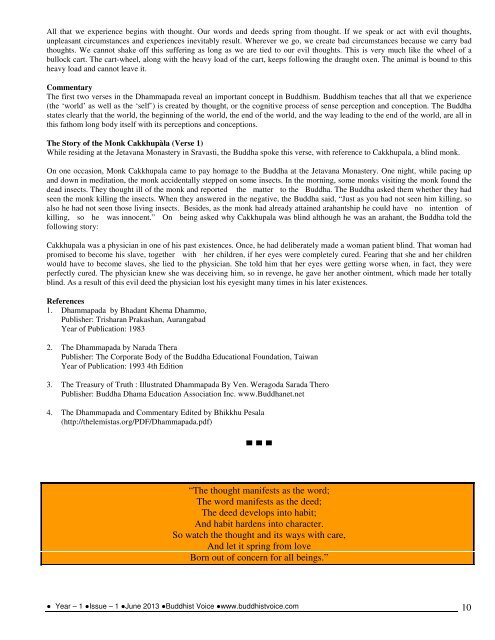BV - June 2013 Yr 1 Issue 1
Create successful ePaper yourself
Turn your PDF publications into a flip-book with our unique Google optimized e-Paper software.
All that we experience begins with thought. Our words and deeds spring from thought. If we speak or act with evil thoughts,<br />
unpleasant circumstances and experiences inevitably result. Wherever we go, we create bad circumstances because we carry bad<br />
thoughts. We cannot shake off this suffering as long as we are tied to our evil thoughts. This is very much like the wheel of a<br />
bullock cart. The cart-wheel, along with the heavy load of the cart, keeps following the draught oxen. The animal is bound to this<br />
heavy load and cannot leave it.<br />
Commentary<br />
The first two verses in the Dhammapada reveal an important concept in Buddhism. Buddhism teaches that all that we experience<br />
(the ‘world’ as well as the ‘self’) is created by thought, or the cognitive process of sense perception and conception. The Buddha<br />
states clearly that the world, the beginning of the world, the end of the world, and the way leading to the end of the world, are all in<br />
this fathom long body itself with its perceptions and conceptions.<br />
The Story of the Monk Cakkhupàla (Verse 1)<br />
While residing at the Jetavana Monastery in Sravasti, the Buddha spoke this verse, with reference to Cakkhupala, a blind monk.<br />
On one occasion, Monk Cakkhupala came to pay homage to the Buddha at the Jetavana Monastery. One night, while pacing up<br />
and down in meditation, the monk accidentally stepped on some insects. In the morning, some monks visiting the monk found the<br />
dead insects. They thought ill of the monk and reported the matter to the Buddha. The Buddha asked them whether they had<br />
seen the monk killing the insects. When they answered in the negative, the Buddha said, “Just as you had not seen him killing, so<br />
also he had not seen those living insects. Besides, as the monk had already attained arahantship he could have no intention of<br />
killing, so he was innocent.” On being asked why Cakkhupala was blind although he was an arahant, the Buddha told the<br />
following story:<br />
Cakkhupala was a physician in one of his past existences. Once, he had deliberately made a woman patient blind. That woman had<br />
promised to become his slave, together with her children, if her eyes were completely cured. Fearing that she and her children<br />
would have to become slaves, she lied to the physician. She told him that her eyes were getting worse when, in fact, they were<br />
perfectly cured. The physician knew she was deceiving him, so in revenge, he gave her another ointment, which made her totally<br />
blind. As a result of this evil deed the physician lost his eyesight many times in his later existences.<br />
References<br />
1. Dhammapada by Bhadant Khema Dhammo,<br />
Publisher: Trisharan Prakashan, Aurangabad<br />
Year of Publication: 1983<br />
2. The Dhammapada by Narada Thera<br />
Publisher: The Corporate Body of the Buddha Educational Foundation, Taiwan<br />
Year of Publication: 1993 4th Edition<br />
3. The Treasury of Truth : Illustrated Dhammapada By Ven. Weragoda Sarada Thero<br />
Publisher: Buddha Dhama Education Association Inc. www.Buddhanet.net<br />
4. The Dhammapada and Commentary Edited by Bhikkhu Pesala<br />
(http://thelemistas.org/PDF/Dhammapada.pdf)<br />
▄ ▄ ▄<br />
“The thought manifests as the word;<br />
The word manifests as the deed;<br />
The deed develops into habit;<br />
And habit hardens into character.<br />
So watch the thought and its ways with care,<br />
And let it spring from love<br />
Born out of concern for all beings.”<br />
● Year – 1 ●<strong>Issue</strong> – 1 ●<strong>June</strong> <strong>2013</strong> ●Buddhist Voice ●www.buddhistvoice.com 10



